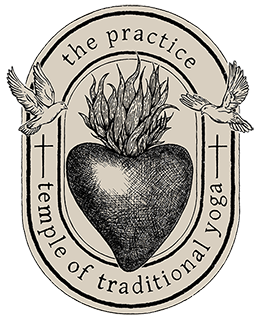by Ami Effendy.
Yoga begins in the present moment, and the present moment begins in silence. From that silence, words are born. In the Yoga-Sutra attributed to Patanjali (third century B.C.E), considered to be one of the core text of yoga psychology, we begin with a simple sentence: “Atha yoganusasanam.” This is translated as ‘in the present moment is the teaching of yoga.
The first word in the Yoga-Sutra – atha- literally means ‘now’, ‘what is here in this moment.” Yoga begins in the present moment. Yoga is the present moment. We could more concisely translate this opening line as: “Yoga begins now”. The teachings of yoga orientate us towards this very moment, rendering the future invisible and the past no longer in reach. Many scholars and practitioners translate yoga as a manifestation of the verb yuj – ‘to unite” – which turns yoga into something one does, a form of willful activity. Yoga is the act of uniting one thing with another (breath with movement, body with mind, self with other).
Yoga is a way of being and a mode of existing. Existence is a play of interconnectedness, and the more we clarity our perception and ways of organizing our experiences, the more openness and compassion we bring to the profound and sometimes confusing undertaking of being in the world. The authentic practice of yoga is an unremitting attention to present experience, weather in mind, body or heart, with a baby on the hip, preparing breakfast, or balancing the breath in a headstand.

According to yoga philosophy and psychology, the only place to begin an investigation of yoga – or of anything for that matter – is the present moment, because this is all that is actually occurring. The future has not yet arisen, and the past is passed; the only thing there is to investigate and the only way to begin paying attention is within this very experience as it unfolds right now, right here. That is why an investigation into the nature of reality and the true nature of the mind begins in this life, this body, and this moment. The mind, with all its fantastic, distracted and creative potential, is so used to weaving conceptions and preferences all over the present moment that we are often relating not to what is actually occurring in life but reacting to life with our perception which is likes and dislikes. That is why psychological inquires in the service of awakening begins with what is happening in the here and now – a form of present-centered attention with acceptance.
The mind has a hard time watching anything for very long, especially its own nature that is constantly moving, looking for something that is more interesting and challenging. The mind has a hard time being present as the breath moves in the body, or as sensations arise and fall away in different yoga poses, and as a result, we are not often here most of the time, we are so easily distracted or interrupted. This is true not just in relationship with our own bodies and emotions but interpersonally as well. Other people interrupt our ideas about the way things are supposed to be. This interruption is precisely what yoga is all about: becoming flexible enough to have our preconceptions and our elaborative tendencies interrupted. We usually discover a lot more in the silent space between thoughts and through all the interpretations, ideas, and views our minds generate. Moments of psychological stillness remind us that there are ways of knowing other than intellectual or habitual. Yoga practice, both on and off the mat, opens up the heart by revealing our patterns of grasping and inflexibility. Through a disciplined and appropriately designed yoga practice, we not only see clearly our conditioned ways of living but we learn how to let go of those patterns so that our questions radically outnumber our answers, thats when we arrive in the present moments of life free to respond with an open and creative heart.
Yoga is an investigation into who we are and what we are. We are looking into the nature of existence by starting with mind, breath, and body. This requires the ability to be patient and accepting of what is occurring in our mind-body so we can see something clearly enough to study it.
In yoga posture practice we dissolve the technique of moving the body into pure feeling and then dissolve the mind into that deep experience of feeling. Then, that is all that is there. In, chanting, as another example, we dissolve seed syllables into pure sound, and then sound into quite, and then quite into stillness, and then stillness becomes nothing other than a contented mind that is open and receptive, sharp and still. When the mind returns to this natural state, anything can arise in mind, body and heart, and there is no pushing or pulling, just arising and dissolving, one form becoming, in turn, another.
If our practice is creating flexibility over the body without a corresponding flexibility of the heart, we need to flag the way we conceive of and engage in practice.
Yoga begins with an honest meeting of our present experience, which means seeing as best we can all aspects of ourselves and our world, including what is most difficult or painful. How much suffering we have felt through our inability to tolerate and live in the midst of change? How much difficulty do we experience from our reactions to the interactivity of feelings, thoughts, movements in the body, and memory?
In the Yoga-Sutra, Patanjali initiates the path of yoga with two first steps: practice (abhyasa) and letting go (vairagya). Cultivating more wholesome intentions and actions of body, speech, and mind, and letting go of historical and ensnaring attitudes, is a constant throughout the entire path. Cultivating positive qualities and letting go of negative factors in our psychophysical makeup gives us a clear starting point for our practice, without which we risk getting lost in the futility of undirected movement.
After a few years of consistent practicing contemporary yoga, I began asking questions. Many of the classes I commonly found in Yoga Studios were not represented in ancient texts, with the absent of psychological understanding in yoga communities and the eventual vanity that comes on the heels of superficial practice. I saw around me, people accomplishing great feats of flexibility and wonderful posture practices, but those same practices did not guarantee psychological or spiritual insight.
What do we aspire to in practice? What motivates our practice? What is the reason for practice? Some say we practice for no reason. But human experience seems always constructed within the context of purpose or meaning. How does one live a good life? What is enlightenment? Is yoga just about physical accomplishment, and if not, why are the ethical and psychological underpinnings of yoga so under spoken? Does one have to finally hold their own heels in back bends, practice arm balance in full lotus, or is there some other test for the liberative validity of practice?
